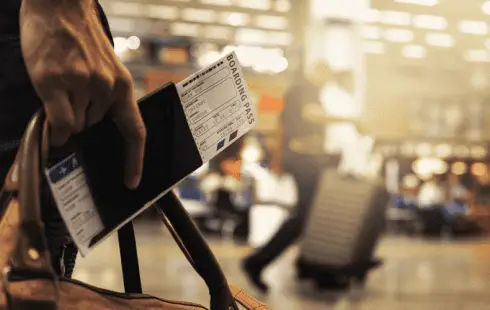Tohru in der Schreiberei, Munich's newest three-Michelin-star restaurant
Section: Arts
 As travelers eagerly anticipate the return of air travel amidst the easing of pandemic restrictions, they may soon find themselves facing an unwelcome surprise at the ticket counter. Effective May 1st, the tax on tickets departing from German airports is set to increase, adding to the financial burden of air travel. While this move promises to bolster state coffers, its implications for vacationers and the aviation industry raise important questions about affordability and accessibility in the post-pandemic era.
As travelers eagerly anticipate the return of air travel amidst the easing of pandemic restrictions, they may soon find themselves facing an unwelcome surprise at the ticket counter. Effective May 1st, the tax on tickets departing from German airports is set to increase, adding to the financial burden of air travel. While this move promises to bolster state coffers, its implications for vacationers and the aviation industry raise important questions about affordability and accessibility in the post-pandemic era.
The decision to raise the ticket tax on flights departing from German airports comes as part of broader efforts to generate revenue for the state. This tax, levied on passengers at the time of ticket purchase, serves as a significant source of income for government coffers. However, the increase in the tax rate will undoubtedly translate into higher costs for travelers, potentially dampening demand for air travel and impacting the aviation industry as a whole.
For vacationers and frequent flyers alike, the increase in the ticket tax represents an additional financial burden at a time when many are already grappling with economic uncertainty. The higher cost of airfare may force travelers to reconsider their travel plans, opt for alternative modes of transportation, or forgo leisure trips altogether. This could have ripple effects across the tourism sector, affecting businesses reliant on visitor spending and dampening economic recovery efforts in destinations dependent on tourism revenue.
While travelers may feel the pinch of higher ticket prices, the ticket tax increase promises to inject much-needed revenue into government coffers. The additional funds generated from the tax hike can be earmarked for essential services, infrastructure projects, or other public investments, providing a financial lifeline for cash-strapped authorities. However, the long-term sustainability of relying on taxation of air travel to fund government initiatives remains a subject of debate, particularly in light of the aviation industry's ongoing recovery from the impact of the pandemic.
Beyond its financial implications, the ticket tax increase also carries environmental implications, as it aims to discourage air travel and reduce carbon emissions associated with aviation. By making flying more expensive, policymakers hope to incentivize travelers to choose greener modes of transportation or opt for alternative destinations closer to home. While this may align with broader efforts to combat climate change and promote sustainable travel practices, it also raises questions about the equity of burden-sharing and the accessibility of air travel for low-income travelers.
In response to the ticket tax increase, airlines may be forced to adjust their pricing strategies and operational models to remain competitive in the market. This could involve passing on the additional costs to passengers in the form of higher ticket prices, implementing cost-saving measures to offset the impact of the tax hike, or exploring alternative revenue streams to maintain profitability. Additionally, airlines may seek to diversify their route networks and explore new markets to mitigate the effects of reduced demand resulting from higher ticket prices.
As travelers grapple with the implications of higher ticket prices, it becomes increasingly important to consider the broader implications of air travel in the context of economic, environmental, and social sustainability. While the ticket tax increase aims to address immediate fiscal challenges and environmental concerns, its impact on travelers and the aviation industry underscores the need for a comprehensive approach to shaping the future of air travel. This includes balancing economic considerations with environmental goals, ensuring equitable access to air travel, and fostering innovation in the aviation sector to address emerging challenges and opportunities.
The decision to increase the ticket tax on flights departing from German airports represents a significant development in the ongoing evolution of air travel. While aimed at generating revenue for the state and reducing carbon emissions, the tax hike also poses challenges for travelers, the aviation industry, and the broader economy. As stakeholders navigate the complexities of the post-pandemic landscape, it becomes imperative to strike a balance between fiscal responsibility, environmental stewardship, and the accessibility of air travel for all. Only through collaboration, innovation, and foresight can we chart a course towards a more sustainable and equitable future for aviation.
Image by Joshua Woroniecki from Pixabay
Section: Arts

Section: Health

Section: Fashion

Section: Politics

Section: Fashion

Section: News

Section: Fashion

Section: Arts

Section: Politics

Section: Health Insurance
Both private Health Insurance in Germany and public insurance, is often complicated to navigate, not to mention expensive. As an expat, you are required to navigate this landscape within weeks of arriving, so check our FAQ on PKV. For our guide on resources and access to agents who can give you a competitive quote, try our PKV Cost comparison tool.
Germany is famous for its medical expertise and extensive number of hospitals and clinics. See this comprehensive directory of hospitals and clinics across the country, complete with links to their websites, addresses, contact info, and specializations/services.
Join us at the Kunstraum in der Au for the exhibition titled ,,Ereignis: Erzählung" by Christoph Scheuerecker, focusing on the captivating world of bees. This exhibition invites visitors to explore the intricate relationship between bees and their environment through various artistic expressions,...



No comments yet. Be the first to comment!